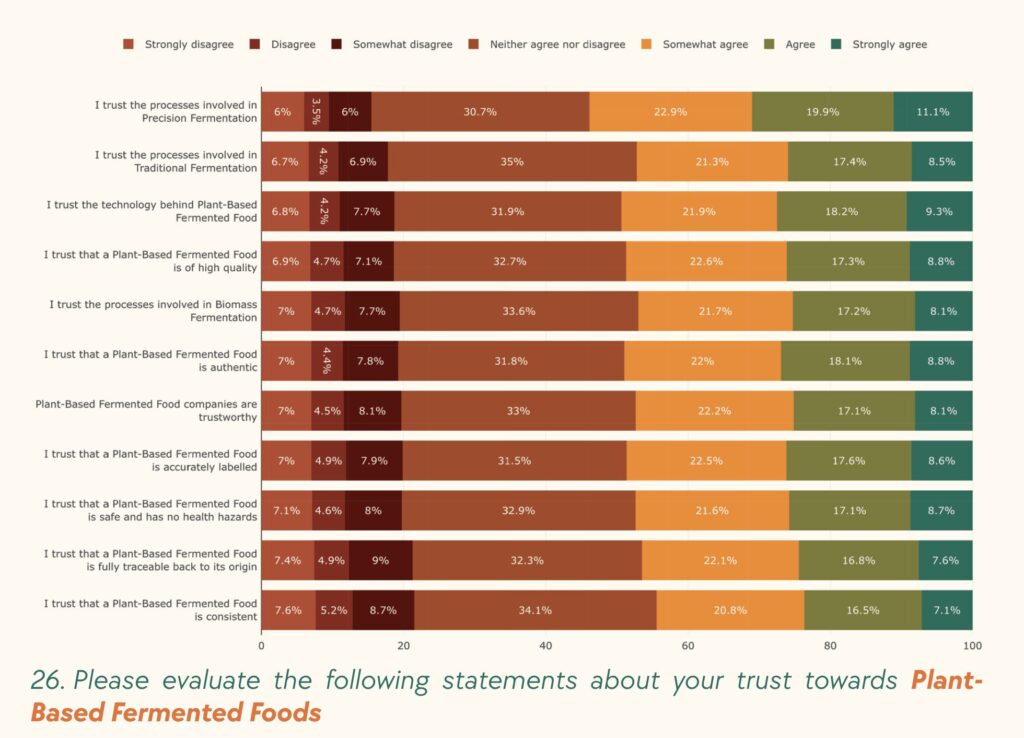Price Parity, Precision Preference: What This Plant-Based, Fermented Survey Tells Us About EU Consumers
7 Mins Read
Europeans are more trusting of precision fermentation than other forms, prefer cost-competitiveness over lower prices for plant-based food, and are divided over the sustainability aspects of alternative proteins, a new survey has found.
This year, fermented foods have really taken off. While good gut health has become more desirable amid the Ozempic boom, consumers have also identified the potential of fermentation technologies to create better-tasting foods.
Investors have recognised this, pouring more money into this segment than plant-based or cultivated proteins. And a host of policy advancements have meant that novel fermented foods are getting increasingly closer to our plates.
So as this sector booms, what do people want from it? This is a question researchers at Sweden’s Umeå University aimed to tackle for the EU-funded HealthFerm project.
Surveying 7,812 citizens in nine EU countries – Belgium, Denmark, Finland, France, Germany, Italy, Romania, Sweden and Switzerland – the poll covered people’s current dietary habits, their attitudes towards meat, dairy, plant-based and fermented foods, and what they want the latter to taste like.
“This groundbreaking study provides valuable guidance for developing innovative plant-based fermentations that are in line with sensory expectations,” said Christophe Courtin, project coordinator of HealthFerm.
“Our research provides insights on how to better communicate these innovations to different segments of consumers in the surveyed countries, hence it is useful for companies, policymakers and practitioners,” added Armando Perez-Cueto, leader of the project’s consumer studies division.
Here are the key takeaways from the plant-based and fermentation food survey.
Meat consumption may be changing, but dairy is hard to shake

While 53% of European omnivores and flexitarians haven’t changed their meat consumption over the past year, of those who have, 40% reduced their intake. This decline was higher among flexitarians (61%) than omnivores (35%), understandably.
Over the next six months, though, 65% of respondents plan to continue their current consumption rates, while nearly 28% intend to eat less meat. For flexitarians, the latter rises to 44%.
However, dairy consumption is much less likely to change – 77% of people intend to do the same amount in the next six months, while only 13% have cut back. It makes sense, then, that dairy products are the most frequently consumed foods, with 46% eating them at least once a day.
Plant-based meat and dairy are the least consumed foods

On the flip side, tofu and vegan cheese are the foods least consumed in Europe, with only 7% of respondents eating them at least once daily – 46% never eat them. Likewise, 40% don’t drink plant-based milk either, with only 10% doing so once or more every day, and 39% never eat plant-based meat.
That said, more people eat plant-based meat (6%) daily than conventional seafood (5%). Moreover, 42% of Europeans eat fruits and vegetables at least once per day.
Consumers are also very unfamiliar with many plant-based fermented foods, like vegan yoghurts (28%), vegan cheese (30%), miso (47%), and tempeh (59%). And over one in five Europeans who have tasted fermented plant-based yoghurts and cheeses don’t consume it, underscoring a gap in satisfaction.
Taste, health and price the key drivers of food choices

Echoing the results of various studies globally, flavour, health and affordability are the most important motivators of overall food choices in Europe too. For 87%, it is important that the food they eat on a typical day provides a pleasurable sensory experience. Healthy (81%) and wallet-friendly (80%) attributes aren’t far behind.
But fewer Europeans care about sustainability (66%), fairtrade and locally produced (64%) and animal welfare in their everyday food choices (68%).
The survey found that 75% of Europeans describe themselves as omnivores, and 16% as flexitarians. When asked what makes them maintain their current diets, 54% of omnivores and 32% of flexitarians said taste. But the importance of health is much more prominent among the latter group, with 28% calling it an influential factor, versus 20% for omnivores.
Animal welfare was third on the priority list for flexitarians, meaning that environmental reasons weren’t in the top three.
Consumers are divided on health and climate benefits of alternative proteins

People’s perceptions fluctuate over different aspects of alternative proteins. Nearly half of Europeans feel fermented plant-based foods facilitate a sustainable and healthy dietary transition (47%) and are good for the environment (46%).
But when asked if they feel fermented foods contribute positively to their health, only 35% agreed, while 28% said the opposite. The most popular statement was that fermented plant-based foods need to have short ingredient lists and be additive-free (56%), and have an organic/bio certification (52%).
When it comes to all plant-based foods (not just fermented ones), 48% agree they help shift towards sustainable and healthy diets, 45% think they’re healthy and nutritional balanced, and 44% find them tasty.
Price matters – but not in the way you’d think

Only 36% of Europeans say plant-based products are affordable in grocery stores or foodservice, and nearly an equal number (35%) feel the opposite way.
But when it comes to fermented foods, the gap between animal-derived and plant-based versions isn’t as wide as one would think. Most brands are aiming to reduce prices of vegan foods to make them cheaper than their conventional counterparts, but this may not always be the best strategy.
A nearly identical number of people said they’d buy more fermentation-derived plant-based meat if it were cheaper (51%) or priced the same as animal-based meat (52%). However, when it comes to milk analogues made this way, more people (53%) would buy them if they’re priced the same as cow’s milk than they would if they were cheaper (46%).
Similarly, if companies price vegan yoghurts the same as conventional yoghurts, 54% of Europeans are more likely to buy the former, compared to 47% who’d do so if they were cheaper.
Convenience a major barrier for plant-based foods

When it comes to the factors deterring people from consuming more plant-based foods, convenience tends to be the most pressing reason. Almost half of respondents (48%) just don’t want to change their eating habits or routines, while 46% find plant-based products inconvenient and 45% don’t think there are enough choices when dining out.
For 46% of Europeans, there’s a feeling that they’d have to eat a large quantity of plant-based food to feel satiated. There are also concerns around food safety (32% think they’re safe, versus 37% who don’t) and protein content (32% say there’s enough protein, and 33% say there isn’t).
Trust in precision fermentation higher than other forms

Surprisingly, more Europeans trust the processes involved in precision fermentation (54%) than in traditional or biomass fermentation (47% each). That said, people are still more willing to try traditionally fermented products (65%), but interest in the other technologies is strong too: 52% would try precision-fermented foods (versus 23% who are unwilling) and 49% are willing to give biomass fermentation a shot (compared to 23% who aren’t).
This is important considering that the EU’s stringent novel foods regulations have kept out precision-fermented novel foods from the region, including successful products like the Impossible Burger (whose key heme ingredient is made using this technology).
Also notable is the finding that 49% of Europeans trust that fermented plant-based foods are accurately labelled, versus just 19% who don’t. While the EU allows plant-based meat products to be labelled as ‘meat’, it still prohibits dairy-related terms from appearing on alt-dairy packaging – but the survey shows that consumers largely trust these labels.
What people want from vegan yoghurts and chicken

When asked what they want from plant-based yoghurts, Europeans largely want white, creamy, uniform and sweet attributes from products (including drinkable yoghurts), alongside some grainy and nutty aromas. Oiliness or fattiness, beany attributes or gel-like characteristics, however, are a no-no.
As for fermented plant-based chicken products, people want more tender and uniform textures, salty and spicy flavours, even colouring, natural shapes, and more realistic appearances. On the other hand, chewy, fatty, long-lasting aftertaste, springy/bouncy, grainy and sticky are undesirable traits.



